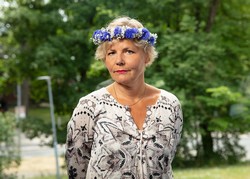In 2012, the Swedish Film Institute began an initiative called 50/50 by 2020. The following year there was a plan put in place to achieve the goals by having equal representation for female film directors. There was a program put in place called Moviement so women in the industry could have mentors, as well as resources, to hopefully encourage women to be part of the film industry.
By 2016, there would be 50 percent funding delegated to female-produced films and 50 percent funding for male-produced films. The next year, there was a report put out by the Swedish Film Institute touching on gender equality in the film industry and then on a larger scale in everyday life.
For the remainder of this year, the goals of this initiative to continuously move towards equal representation of men and women in the film industry include women in more key roles for larger films, increased visibility, and continuous education on gender equality and other kinds of diversity.
The CEO of the Swedish Film Institution, Anna Serner, is a huge advocate for this initiative and speaks often about her opinions. She wants to spread the word about gender inequality, what she has been doing to help and what she believes can still be done to help. In an interview with Rebecca Martin of Cinema Femme, she stated,“We have a responsibility to find the equality in the industry. We want to work with gender equality and diversity, and we want to take all of the talent in consideration… it’s just ridiculous to believe that you leave half of the population out.”
 Her message is very clear: no matter you gender, race or anything else that might make you “different” you have so much to offer the world and can get your voice out there, especially through art. Opportunities should be given to people across the board regardless of differences, because every single person has something to offer.
Her message is very clear: no matter you gender, race or anything else that might make you “different” you have so much to offer the world and can get your voice out there, especially through art. Opportunities should be given to people across the board regardless of differences, because every single person has something to offer.
Associate Professor of Sociology Johanna Foster, Ph.D., agreed with Serner’s initiative and thought the program is fantastic. “They have made such important inroads in closing the gap in gender inequality in the film industry by using the tools of social research, so that is especially inspiring to me as someone who went into feminist sociology to do the same,” Foster said.
She continued, “I think many people can get overwhelmed with the scope of the problems and wrongly believe there is nothing they can do to really change things, but this project shows how a small group of women asking the right questions who are not afraid to ask the right questions, and do the work of digging up the answers, can have a huge impact.
There have been other film institutes that are beginning similar initiatives to spread awareness of gender inequality and make a more equal industry for men and women. The British Film Institute and Eurimages are two examples of film institutes in different countries following along. However, a huge number of film festivals have signed the 5050 by 2020 pledge, including Cannes, Sundance, Toronto, Berlin and Venice.
Arguably more important though, there has been a conversation started about the inequalities in the film industry, among other arts and throughout society around the globe.
Foster thought the program will encourage film industries around the world to reflect on gender equality. “[The Swedish Film Institute’s] work raises up the reality that gender and racial inequality manifest themselves in both obvious and not so obvious ways in the film industry, and it’s important to look closely and critically at what’s going on. I’m glad we have a resource like this out there and I’m sure it will have an impact beyond Sweden,” Foster concluded.
There has been extensive press about Sweden and other countries which is getting people to talk about what is going on. Education is huge in initiatives like this, so the public understands why film industries are making these changes.
Women like Anna Serner who choose to openly speak about their experience and actively try to make changes in any part of inequalities in the world are the reason there are new conversations about these things and more people spread awareness and will make changes. Hopefully there will be more companies taking steps towards equal funding and representation for people all of genders, races and everyone else who hasn’t felt like they have a voice.
Let’s push to give everyone a voice.
IMAGE TAKEN from NewsBreezer
IMAGE TAKEN from Phoenix Critics Circle




